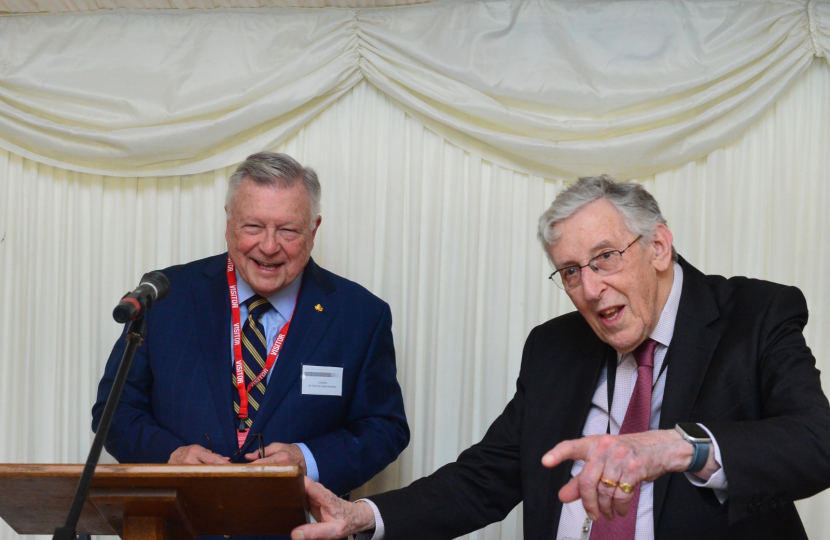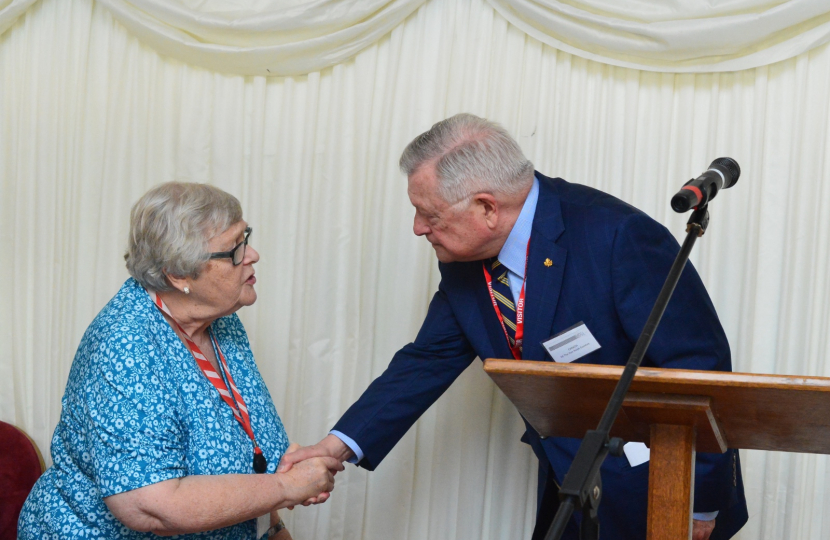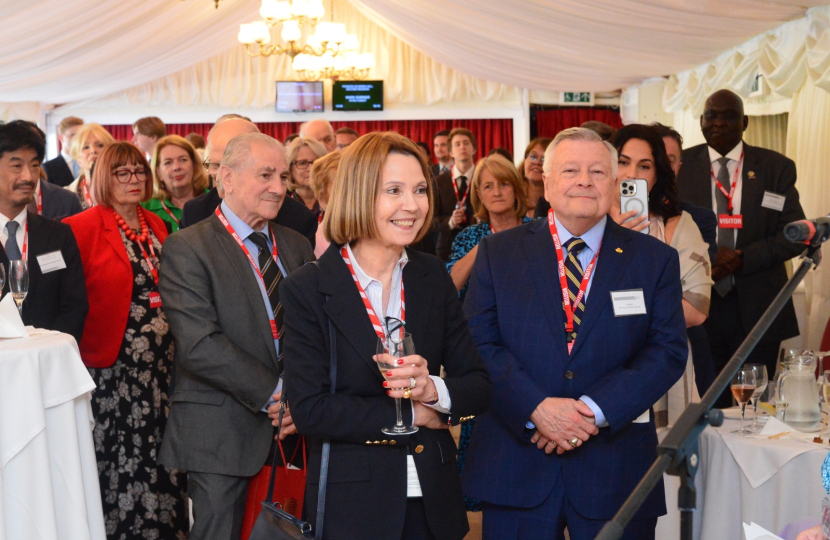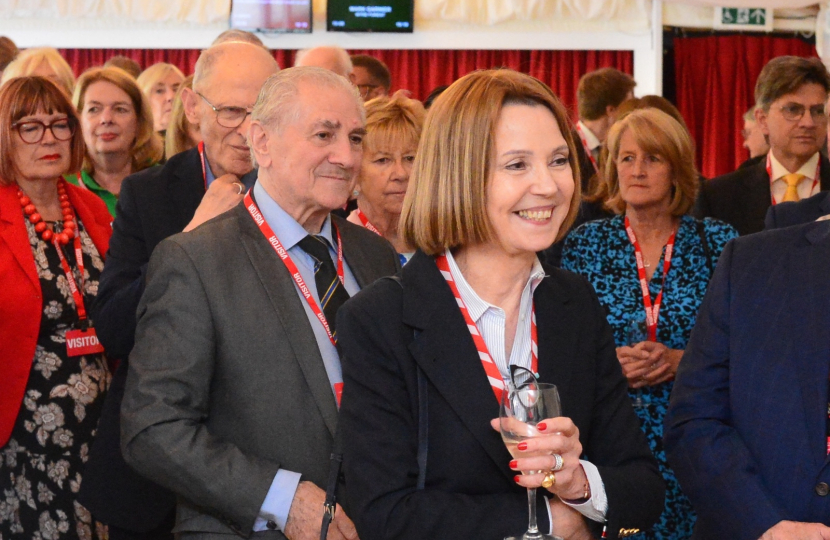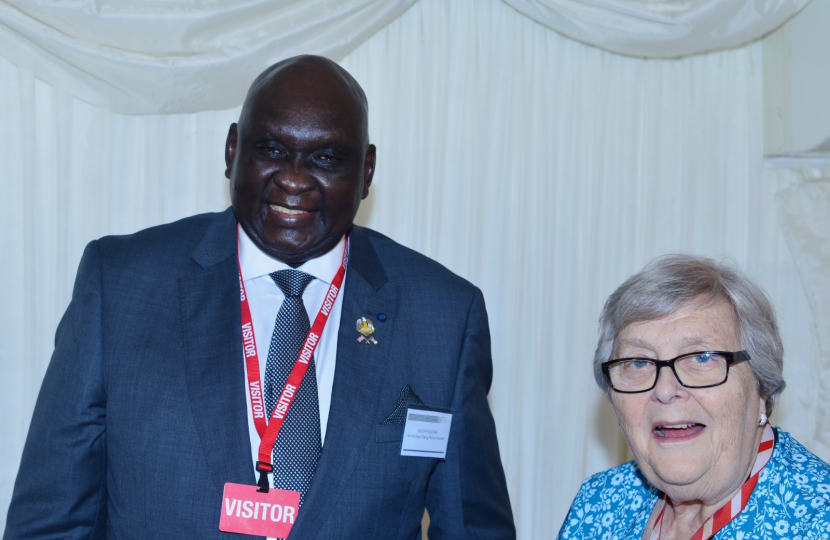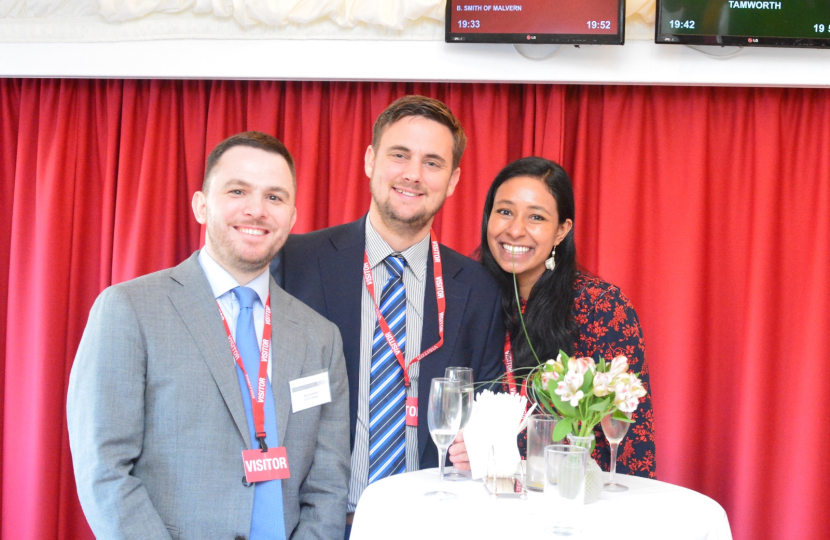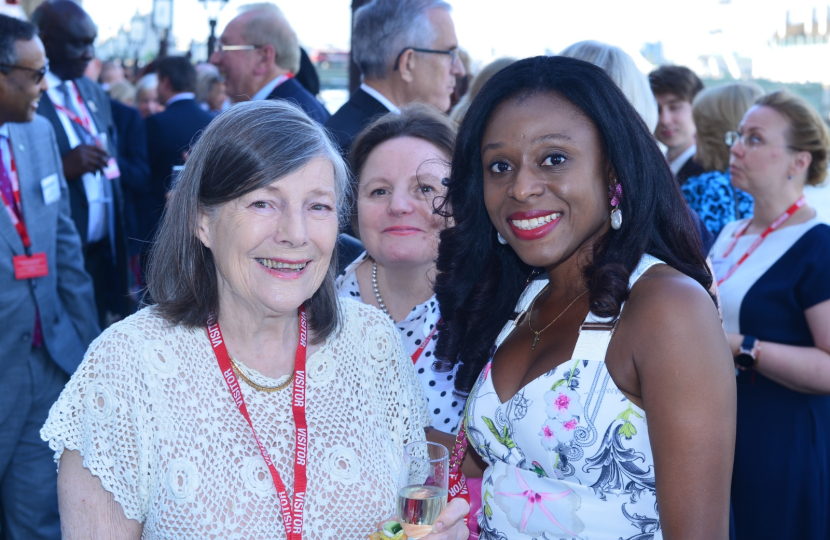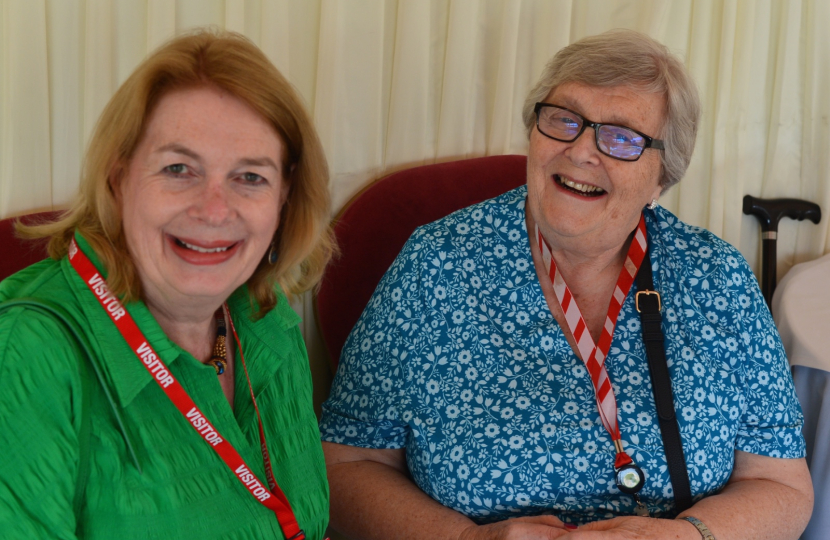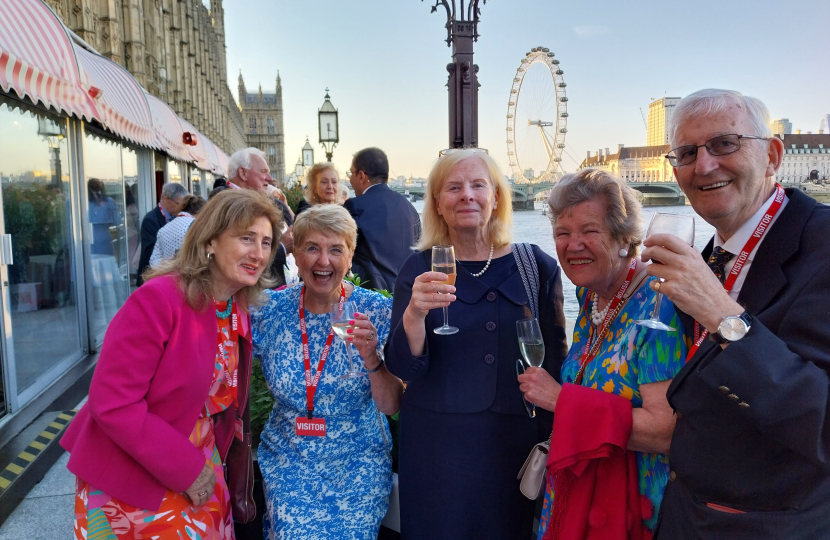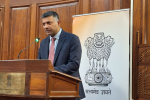The Summer Diplomatic Reception of the Conservative Foreign & Commonwealth Council (CFCC).
The highlight of the CFCC’s Summer programme is the Summer Diplomatic Reception which is held on the Terrace of the House of Lords by kind permission of Lord Howell of Guildford, CFCC’s President.
The Reception enables CFCC members and their guests to meet and listen to a distinguished guest speaker and to meet the invited Ambassadors, High Commissioners and other Embassy representatives.
This is a highly sought- after and popular event and attracts always many diplomats and members of the Houses of Parliament and it enables Diplomats and guests the opportunity to mingle and appreciate the unique setting overlooking the Thames and enjoy an interesting and convivial evening.
This year the Reception took place on Monday 7th July and H.E. The Hon Ralph Goodale P.C, High Commissioner for Canada, was the guest speaker.
Baroness Chalker of Wallasey CFCC’s President for Life welcomed the assembled diplomats and other guests and she was followed by Lord Howell, who reflected on the changing world and the role of the Commonwealth of which Canada is an important member.
Baroness Meyer, CFCC’s Chairman, then warmly introduced High Commissioner Goodale who for four years has been Canada’s High Commissioner to the Court of St James’s. She explained that for forty years he was a Parliamentarian in Canadian domestic politics and he has a background in farming and law.
The speech was inspiring and very well-received in which HE Goodale emphasised the long-standing close ties between Canada and the UK - to be found in so many fields - (not least cultural), and he described the reactions of Canadians to the current economic hostility being shown against Canada by the administration of it’s much larger Southern neighbour. His speech is reproduced in full below.
Baroness Nicholson of Winterbourne, a Patron of the CFCC, thanked H.E Ralph Goodale for his most informative speech and for answering a number of Member’s questions.
Lady Nicholson also thanked Melissa Crawshay - Williams, CFCC’s Honorary Secretary, for once more organising such an excellent and stimulating evening.
William Knight
13.07.2025
Text of Speech by H.E. HON. RALPH GOODALE, P.C.
High Commissioner for Canada in the United Kingdom
to the
CONSERVATIVE FOREIGN AND COMMONWEALTH COUNCIL
House of Lords, London
July 7th, 2025
Your Excellencies, M’Lords, Parliamentarians, distinguished guests, ladies and gentlemen:
Good evening and thank you for inviting me to say a few words tonight. Let me extend to everyone the greetings and good wishes of the Government of Canada. It is an honour to meet with the Conservative Foreign and Commonwealth Council … and to make a few observations from a Canadian perspective.
I have been Canada’s High Commissioner in London for more than four years now – so, as these diplomatic roles tend to go, I am probably into “overtime”. I came to this job after more than 40 years in active Canadian politics. That combined background provides some perspective to draw upon.
For any national leader anywhere in the world in any era, their first and most important “duty of leadership” is to keep their people safe and secure.
In Canada, given the vast diversity of our population, spread across six time zones, in very different regions and with very different resources, economies and interests, the government’s second most important duty is keeping Canadians united and pulling together in the midst of all our complexities.
The third duty of leadership in Canada – and this is proven true down through the years – is figuring out how to function successfully up against the world’s biggest, richest, most powerful – often friendly, but sometimes cantankerous – next-door-neighbour.
Since the US elections last November, these three imperatives – national security, national unity and national sovereignty – have dominated both foreign and domestic policy in Canada, including through a federal election campaign that produced a surprising result that was unthinkable just a few months ago.
Both geo-politically and economically, the world in which we live is probably more divided and more dangerous now than at any time since WW2. The rule of law is being replaced by “might makes right”. And drift in that direction never ends well.
On top of that, Canadians are deeply perplexed by US declarations of an intent to use “economic force” – such as the weaponization of tariffs – to weaken Canada, so eventually we might be annexed.
Instinctively, the Canadian reaction to that notion is a resounding NO! Or perhaps, in a style more typically Canadian – No thank You!
From our perspective - Why would we “give up” our less polarized, more accommodating, more inclusive way of life, with lower rates of violence, and a deep commitment to the rule of law through a democratic constitutional Monarchy? (That different form of governance was proudly on display in Ottawa at the end of May when Their Majesties, the King and Queen of Canada, opened a new, democratically-elected Parliament with sovereign authority over everything Canadian.)
Why would we surrender Canada’s Triple-A credit rating, the lowest debt ratio in the G7, a secure and prudent banking system, 20% of the world’s fresh water, enormous reserves of natural gas, uranium, potash and critical minerals, and some of the best brains in the world on emerging technologies like AI and Quantum?
Why would we compromise our quality of life? We have less child poverty, greater life expectancy, higher levels of educational attainment, more broadly-based, and a healthcare system where the first thing they check is actually your pulse, not your credit card.
Canadians did not “ask” for a trade war. We did not start one. But spontaneously and instinctively, we have pulled together like I have rarely seen before to defend ourselves and one another. Our response to attacks on our sovereignty consists of five core elements.
First, we are constantly reminding the American administration, every level of government, both parties, business, labour, the media and the public about how counterproductive and damaging these tariff attacks really are – for us, sure, but also for the United States itself. Tariffs inflate US prices. They hurt US jobs. They damage US efficiency. They diminish US prosperity.
Second, we are calmly pushing back with carefully calibrated retaliation, ensuring our countermeasures have maximum impact in the United States and minimum impact in Canada.
Yes, we recognize the American economy is 10-times bigger than ours, but we are not without some leverage. Canada is the biggest single market in the world for about 40 US states. Americans sell more to Canada than they sell to China, Japan, France of the UK combined. Seventy percent of what Canada sells to the US are inputs into US manufacturing, supporting American jobs and communities.
Third, we are providing support programs to help Canadian workers and businesses get through this tough time. Complete compensation is not possible, but we can soften the blow, and we are.
Fourth, in the spirit of never wasting a good crisis – we are building out the Canadian economy to be bigger, stronger and more resilient on its own, less dependent and less vulnerable to whatever any foreign power might try to do. Quite frankly, these are things we should have done long ago.
We are tearing down internal trade barriers between and among provinces within Canada. We are accelerating the regulatory process to approve big, nation-building projects. We’re investing in strategic infrastructure, and in more science, technology and innovation. We are utilizing both our natural resources and our brainpower to make Canada a genuine superpower in both conventional and renewable energy. We are reducing federal income taxes. And we will diversify our external trade far beyond the United States.
The fifth element in our response is unity. The provocations of recent months have pulled Canadians closer together, but that was maybe the easy part. We need to maintain that cohesion and enthusiasm for the long haul. That means testing every step we take against three criteria – Is the step necessary? Will it be effective? And is it fair? If those tests are met, I am confident Canadians will continue to have each others backs.
We will also be careful to work closely with our most steadfast and reliable allies, partners and friends – none more so than the United Kingdom.
Economically, the bilateral relationship between the UK and Canada – two-way investment and trade – already adds up to more than $550B. We can make that grow. But our relationship is about far more than money. It is rooted in centuries of shared history, in a vast reservoir of respect and trust earned through all that lived-experience with one another, and the common human values that we have promoted and defended together in the world for a very long time.
Through recent weeks, at G7 and NATO summits, Canada and the UK have been shoulder-to-shoulder, making firm new commitments to defence spending, defence production capacity and necessary investments in security and intelligence. We are in lock-step in support for Ukraine.
In mid-June in Ottawa, our two Prime Ministers laid out an ambitious bilateral plan for broader and deeper partnerships in Growth and Innovation and in Enhanced Defence and Security. The subject-heads on their agenda are exciting – critical minerals, AI and sovereign artificial intelligence infrastructure, semiconductors, quantum, the digital economy, biomanufacturing, civil nuclear energy, cyber security, strong, effective, efficient borders … the list goes on.
The will, in both our countries, to move forward at a pace that is out of the ordinary is both noted and welcome.
For Canada, Prime Minister Carney is a man in a hurry. He sees a world beset with multiple crises, on top of our domestic challenges, and a window of opportunity now open to deal with those crises and challenges more decisively than perhaps ever before. This is not a time for “business as usual”. He wants to get as much accomplished as possible, before consensus fragments, momentum wanes and the window closes.
The Prime Minister’s three prime objectives are:
*First and foremost, the safeguarding of Canadian sovereignty, absolutely and without question;
*Second, building a new functional economic and security relationship with the United States that works for Canada, because the old one that we have known for 80 years is over – that will mean greater Canadian responsibility for and investment in our own defence and security systems; and
*Third, driving Canadian economic growth, innovation, productivity and trade in a manner that is more self-reliant, less beholden to the US and more connected and engaged with reliable, steadfast allies, partners and friends in the UK, the EU and the rest of the world.
May I make one final observation about the Commonwealth, because that is part of this Council’s mandate.
I am an optimist about the Commonwealth. The Secretary-General, Shirley Botchwey from Ghana, is working hard to strengthen the administration, achieve efficiencies, enhance transparency and accountability, and focus on priorities where the Commonwealth has expertise and can provide real value-added. Her rapport with Member States and the Board of Governors seems to be positive and strong.
In a world in which multilateralism is a bit tattered, she and the Commonwealth have an opportunity to demonstrate their worth – partly because the Commonwealth is the one large multilateral organization with global reach – north/south, east/west, big/small, wealthy/and not, 56 countries, five continents, 2.5 billion people – and it’s NOT dominated by Russia, China, the EU and the United States.
So others get an opportunity to have a voice and be heard – especially in the global quest for good governance, democracy, human rights and the rule of law.
Mr. Chairman, thank you for this opportunity and for your kind attention.
#

